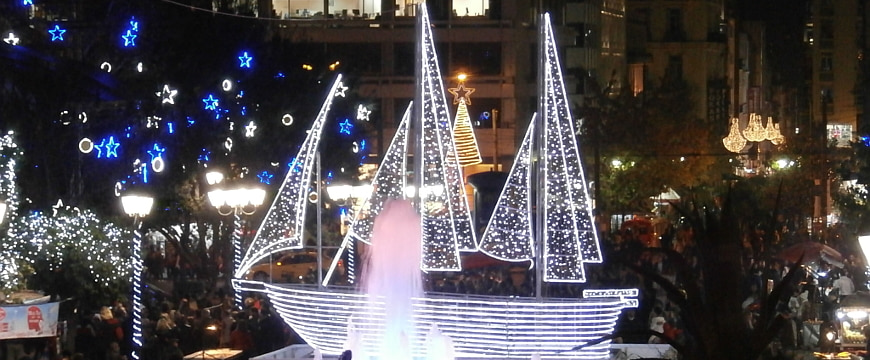Many ask what Christmas time is like in Greece. Is Christmas a major holiday? Yes. Is it on the same day as in the USA? Yes. Are there Christmas trees and gifts? Yes, plus charity bazaars, shopping, choirs, special church services, and Nativity scenes. However, Greek customs and flavors differ from those central to my American holidays in many ways.
For example, Saint Basil (Agios Vasilis) takes the place of Saint Nicholas or Santa Claus, and he brings gifts on January 1, not on Christmas. There are poinsettias, but they grow into trees when planted outside. Christmas lights form stars, trees, and angels—but also boats. Small model boats, outlines of boats, and real fishing boats can all be illuminated with white lights. This old tradition makes sense for a Mediterranean nation with an extensive coastline, a history of seafaring and fishing, and almost countless islands.
During their two week school vacation, pairs and groups of schoolchildren go door to door in their neighborhoods, singing a different, specific Greek carol (kalanda) on each of three mornings: Christmas Eve, New Year’s Eve, and January 5, the Eve of the Epiphany. Generally accompanied by a triangle, the children are offered sweets and pocket money.
The 40 day Nativity Fast before Christmas is one of the Greek Orthodox church’s main fasting periods, although Greeks’ adherence to this tradition varies, and its rules are not the same every day.
That is helpful, since bakeries offer large piles of traditional Greek Christmas cookies well before the fasting period ends: the snowy white kourambiedes, shortbread cookies buried in powdered sugar, and the spicy brown, egg-shaped honey and olive oil cookies, melomakarona. I was surprised to see a recipe for kourambiedes with olive oil replacing the traditional butter, from chef Maria Loi. Why not? These days, both types of cookies can also be found in chocolate covered versions.
On Christmas Eve, many Greeks have traditionally baked the Christopsomo Greek Christmas Bread (or Christ’s bread—the meaning of the Greek name), with a cross on top of it. This bread can be made with olive oil, raisins, nuts, brandy, orange juice, and spices, as in this recipe. Diane Kochilas explains the significance of this and other symbolic breads in Greek culture.
As New Year’s Eve approaches, bakeries begin to feature various versions of the vasilopita, which honors Saint Basil (Agios Vasilis). The vasilopita is most often a large round cake. There is a coin hidden in it that is said to bring good luck for the New Year to the person whose piece contains it. (This is, therefore, a cake to eat with care.) The cake is cut at home on New Year’s Day (any time after midnight), and in schools, organizations, and businesses throughout January. Elena Paravantes has shared more than one recipe for this cake; I’d like to try her olive oil and lemon version (although I also like it made with olive oil and orange).
The Christmas season is the only time I can find whole turkeys to roast in my part of Crete. Turkey is a relatively recent addition to a Christmas dinner traditionally focused more on pork, which used to come from the pig that families slaughtered on Christmas Eve. Diane Kochilas provides an interesting concise history of traditional Christmas pork and shares olive oil rich pork recipes from various parts of Greece.
Although Greece is a relatively small country, traditions vary from one place to another. For examples of some Christmas dinner favorites, such as egg lemon sauce and stuffed cabbage rolls, see From Snout to Tail: Greek Regional Christmas Traditions. Made with plenty of olive oil, stuffed cabbage rolls are one of my favorite Greek foods any time of year—although I’ve never had them for Christmas.
While the Mediterranean diet sometimes seems rather distant during the holidays, several of its key ingredients are constant features: oranges, honey, and olive oil remain central to Greek tradition, bringing sweetness and health to the end of the year and the New Year.
All businesses, organizations, and competitions involved with Greek olive oil, the Mediterranean diet, and/or agrotourism or food tourism in Greece, as well as others interested in supporting Greeks working in these sectors, are invited to consider the advertising and sponsorship opportunities on the Greek Liquid Gold: Authentic Extra Virgin Olive Oil website. The only wide-ranging English-language site focused on news and information from the Greek olive oil world, it has helped companies reach consumers in more than 215 countries around the globe.


